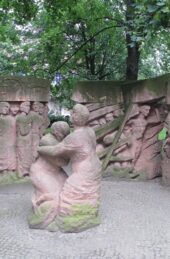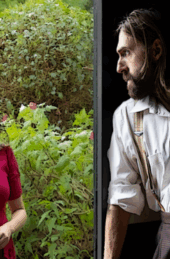The past cannot be told in just one narrative any more than the entire world can be viewed through just one lens pointed at just one angle. In my novels, I seek to present a reality constructed not only of what is remembered of the past, but of what is forgotten – I want to bridge the gap between this hidden reality and our available, fact-based history. It is a distinction between Hayden White’s ‘truth’, that historical veracity that historians seek, and the ‘authenticity’ of the reality of history that gives an impression of accuracy, or how readers believe in such a representation of the past. And this, of course, is relative within historical fiction, as the choices an historical novelist makes – between fact and fiction – affect her authentic, realistic representation of her narrative.
The history of which I tend to focus on is that of Polish history during WWII, born from my own familial story and one which I feel there is much still to explore. Indeed, I like to find those small untold stories that perhaps are still hidden by the mainstream by trauma or shame, or both, and bring them to life for the reader; looking through multiple lenses of the past to recreate a history that is balancing on the edge of what is ‘true’ and what is ‘real’.
In the writing of All the Courage we have Found, I wanted to highlight the risks and achievements of Polish women and men during the Second World War, amalgamating these little known histories into that of one female character, Kasia, and I wanted to further look back at the past through the lenses of trauma and shame, to recreate a ‘lived’ history of both Hugo and Elodie.
The novel also touches upon the beginnings of the Enigma machine – a story well known thanks to the movie The Imitation Game, highlighting Alan Turing’s achievements in breaking the Nazi codes of World War II. However, what is little spoken about are the Polish mathematicians and code breakers who were instrumental in breaking the codes as far back as 1932. These cryptographers, Marian Rejewski, Jerzy Różycki and Henryk Zygalski, joined the Polish Cyper Bureau and by 1939, knew 95% of the Germans’ order of battle before the invasion of Poland.
That is not to discount female mathematicians in Poland too, such as, Anna Zofia Krygowska who held clandestine study groups, and those female resistance fighters who amongst other resistance efforts, were able to infiltrate ghettos, getting messages, food and supplies in, and and at times, people out.
Maria Krystyna Janina Skarbek is to be noted here too, who joined the British Special Operations Executive (SOE) and was lauded for her daring exploits as a spy, infiltrating Nazi occupied areas. So too those women who risked their lives for the SOE, working as radio operators with an expected life expectancy behind enemy lines of just six weeks.
This may seem like a huge amount of history to explore in just one book, and yet, I could see my protagonist, Kasia clearly here. A woman who was intelligent and a student with like-minded mathematicians, a woman who had brave friends like her, who worked for the resistance and never gave in. And, of course, of a Polish woman, just like Krystyna Skarbek, who knew she could help her country and her countrymen and risked her life by going behind enemy lines.
Each strand of history I wanted to represent was filtered through not only Kasia, but her sister, her friends in Poland, Hugo and Elodie, amongst others. Through each character, their motivations and their secrets, I found I was able to build a history that felt ‘real’ to the reader, and provided the ‘truth’ and veracity that one seeks within such a genre.
The version of ‘truth’ to be told became a compilation of the ‘truths’ of the many – a narrative truth, rather than that of historical truth – of what actually happened historically. I, as an author of historical fiction, with my choice between the truth and the real, aimed to portray a rounded picture of the past, one which demonstrates that the history of a private life is just as important as the history of public life.

Carly Schabowski is the author of All the Courage we have Found, out now and published by Bookouture.






